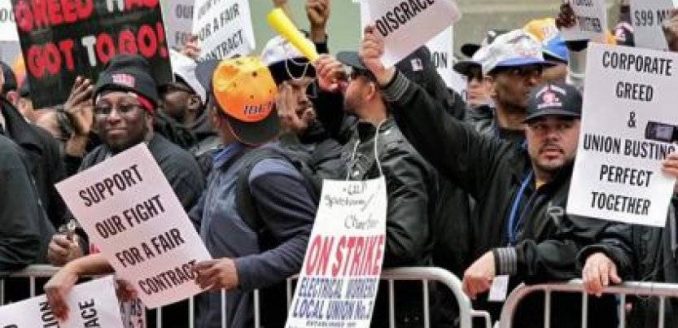Spectrum strike: Second year in workers’ war with banks
It has now been over a year since 1,800 members of International Electrical Workers (IBEW) Local 3 went on strike against cable monopoly Spectrum/Charter in the New York City/New Jersey area.
Strikes against utility companies are often long struggles, even when it’s the largest strike in the country, as was #SpectrumStrike at one time. Strikers can stop repairs, but they can’t stop the automated production. This strike has its own unique conditions, leading to the persistence of Spectrum/Charter trying to break the workers and their union. To understand, we need to get into the economics around the recent takeover of Time Warner by Spectrum/Charter.
In 2015, Spectrum/Charter gobbled up Time Warner and became the second largest cable provider in the U.S. Mergers like this have reached gargantuan proportions — so much so that one individual company alone doesn’t have the money on hand to actually purchase another company as big as Time Warner.
Even Spectrum/Charter needs help — which must be be gotten from Big Banking. But taking money from the banks comes with a catch — a catch that Lenin described over 100 years ago in his popular pamphlet of 1916, “Imperialism: The Highest Stage of Capitalism.” The lesson that still applies is quite simple: The banks become the boss — what Lenin called the “finance capitalist.”
The banks only lend out billions of dollars if they know they are going to get something in return. So when Charter/Spectrum took on $27 billion in debt to finance the purchase of Time Warner, the company effectively handed decision-making over to their lenders.
The banks push to eliminate worker benefits and bust unions. Attacking the workers is the same tactic all bosses use to extract more profits from a company. But the banks are more vicious and unrelenting because they can afford to be. They do, after all, hold the entire bourgeoisie’s wealth in their coffers.
Despite a year of its workers striking, Charter/Spectrum — backed by a large segment of the finance capitalist class, including such big names as Goldman Sachs, Bank of America, Deutsche Bank and Credit Suisse — still refuses to bargain with IBEW Local 3.
It is a tribute to the power of IBEW and the loyalty of its members that the union has held out for over a year during this onslaught by the financial capitalist class.
Workers are doing everything they can to continue the strike, but there is a financial toll. The local is digging deep into the pockets of its strike fund, paying striking workers $350 a week. But once workers use up their personal savings, that fund doesn’t cover basic expenses. In the last few months, some workers have reported difficulties paying rent, and they’ve turned to borrowing from friends to get by, in hopes that the struggle will soon end.
These are the conditions that have turned the #SpectrumStrike from a struggle between workers and one boss into a titanic struggle between one of the country’s most powerful unions and the entire financial capitalist system.
With a new wave of labor militancy rising from West Virginia’s education workers, raising class consciousness across the country, what can militants do to help IBEW Local 3 win? West Virginia showed that it took more than the teachers and support staff to win. Solidarity was the key, as students, parents and other unions all came out in force to show support.
Spectrum currently services 25 million customers in the U.S., potentially a huge base of support for the #SpectrumStrike. If enough people refuse to pay for their service or transfer their service to another company, the banks will get the message, and tell the company to back off.
Solidarity between consumers and workers is already organically there. Since the merger, Charter/Spectrum, besides slashing worker benefits, has jacked up its prices to pay off its debt. As a monopoly, it can afford this, since in many cases the company is the only cable provider in an area.
The Charter/Spectrum local monopoly also creates a potential fightback strategy. What if militants in New York City, for instance, pushed the city council to revoke Spectrum’s franchise? Of course, a general strike or even smaller solidarity strikes in key industries could always tip the balance in the favor of the workers!
These are all potential tactics to help the #SpectrumStrike. Whatever form this strike takes going forward, it’s clear that to win, we must fight together.
It should be stressed that we all stand to benefit if IBEW Local 3 wins.
Since 1916, when Lenin first diagnosed the rise of finance capital, the rule of the banks has only spread and deepened. The #SpectrumStrike is but one battle in this global war of the banks against the people.


